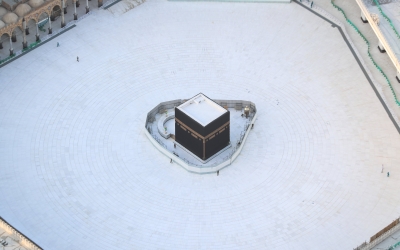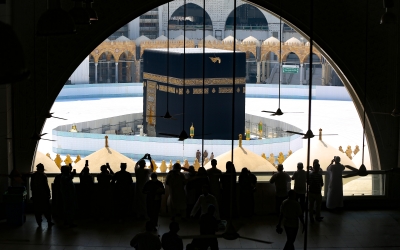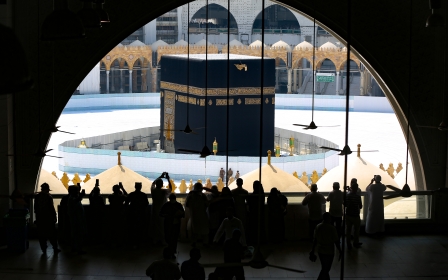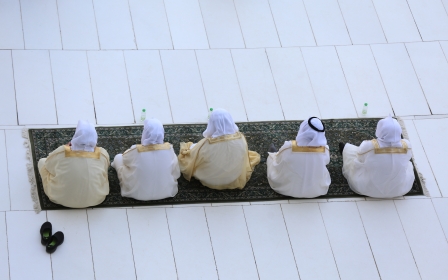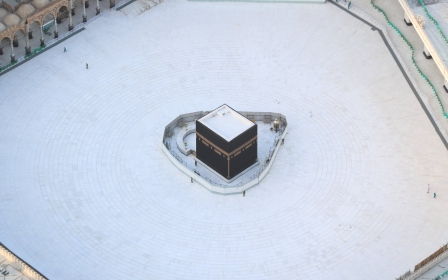Coronavirus: Saudi Arabia says scaled-down Hajj pilgrimage to start on 29 July
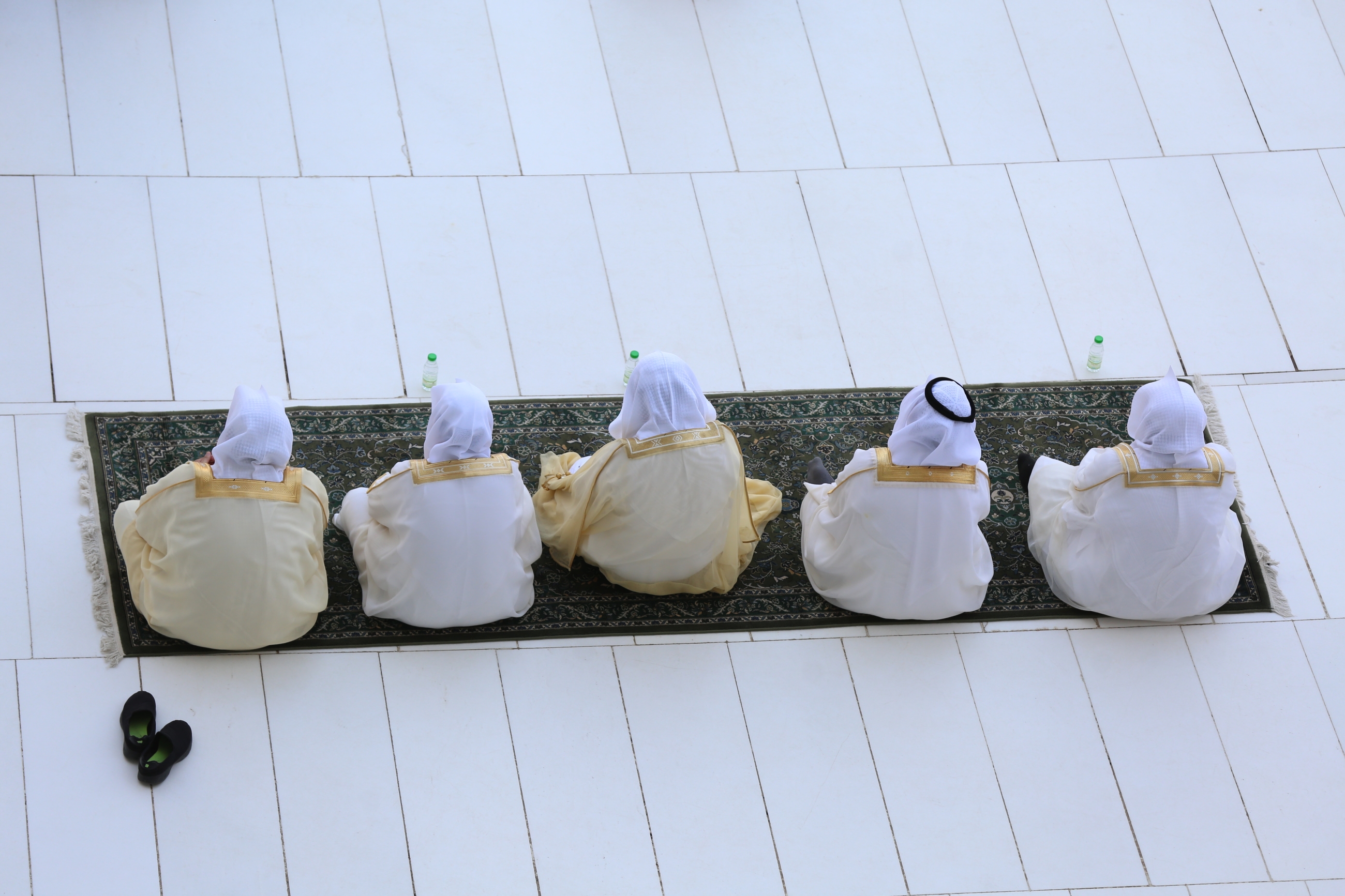
This year's Hajj, which has been scaled back dramatically to include only around 1,000 Muslim pilgrims as Saudi Arabia battles a coronavirus surge, will begin on 29 July, authorities said on Monday.
Some 2.5 million people from all over the world usually participate in the ritual that takes place over several days, centred on the holy city of Mecca.
This year's Hajj will be held under strict hygiene protocols, with access limited to pilgrims under 65 years old and without any chronic illnesses.
"The stand of pilgrims on Mount Arafat, the peak of the Hajj ritual, falls on Thursday," the official Saudi Press Agency cited the Supreme Court as saying, indicating that Wednesday would be the first day of the annual event.
The timing of the Hajj is determined by the position of the moon, in accordance with the Islamic lunar calendar.
Last month, Saudi Arabia announced it would hold a "very limited" Hajj, a decision fraught with political and economic peril as it battles the coronavirus pandemic.
It has seen some 253,349 cases so far including 2,523 deaths - the highest toll among the Arab Gulf states, AFP reported.
Although Hajj officials said the pilgrimage would be restricted to 1,000 people already present in the kingdom, 70 percent of them foreigners and the rest Saudis, some press reports have said that 10,000 people may take part.
The ritual will be restricted to medical professionals and security personnel who have recovered from the virus, the Hajj ministry said.
Heavy blow
The decision to exclude pilgrims arriving from outside Saudi Arabia is a first in the kingdom's modern history and has sparked disappointment among Muslims worldwide, although many accepted it was necessary due to the pandemic.
The pilgrims will be tested for coronavirus before arriving in Mecca and are required to quarantine at home after the ritual, according to health officials.
Historical cancellations of Hajj
+ Show - HideSince the Kingdom of Saudi Arabia's founding in 1932, the annual Hajj pilgrimage has never missed a year, with hundreds of thousands heading to Mecca during the month of Dhul-Hijjah (Month of the Pilgrimage).
Historically, however, the pilgrimage expected of each Muslim in their lifetime has been cancelled around 40 times, mostly due to disease, conflicts and banditry.
Middle East Eye takes a look at a few of the most dramatic cancellations since the first Hajj of 629.
865: Massacre on Arafat Mountain
During his conflict with the Abbasid Caliphate based in Baghdad, Ismail bin Yousef, known as Al-Safak, launched an attack on the holy Arafat Mountain overlooking Mecca in 865, massacring pilgrims there. The raid forced Hajj to be cancelled.
930: Qarmatian attack
In 930, Abu Taher al-Janabi, the chief of the Qarmatians heterodox sect based in Bahrain, launched an attack on the holy city of Mecca.
Historical accounts say the Qarmatians killed 30,000 pilgrims in Mecca and dumped their bodies in the sacred Zamzam well. They also looted the Grand Mosque and stole the Black Stone from its Kaaba and took it to Bahrain.
The Hajj was suspended for a decade until the Black Stone was returned to Mecca.
The Qarmatians were an Ismaili Shia sect who believed in an egalitarian society and considered pilgrimage as a pagan ritual.
1831: Plague
Not only conflicts and massacres have cancelled Hajj. A plague from India hit Mecca in 1831 and killed three-quarters of the pilgrims there, who had endured weeks of travel through dangerous and barren lands to perform Hajj.
Saudi Arabia has seen an uptick in both confirmed infections and deaths from Covid-19 since easing movement restrictions in late May. It has yet to restore international air links.
The Hajj, a rite that should be performed by all able-bodied Muslims at least once in their lifetime, could be a major source of contagion, as it packs millions of pilgrims into congested religious sites.
The Saudi-based Muslim World League and the Organisation of Islamic Cooperation have backed the government's move for the health and safety of pilgrims.
But the decision still risks angering some Muslims for whom religion trumps health concerns.
Lost revenue
A scaled-down Hajj represents a major loss of revenue for the kingdom, already reeling from the twin shocks of the virus-induced slowdown and a plunge in oil prices.
The smaller year-round Umrah pilgrimage was already suspended in March.
Together, they add $12bn to the Saudi economy every year, according to government figures.
Hosting the Hajj is a matter of prestige for Saudi rulers, for whom the custodianship of Islam's holiest sites is their most powerful source of political legitimacy.
But a series of deadly disasters over the years, including a 2015 stampede that killed up to 2,300 worshippers, has prompted criticism of the kingdom's management of the pilgrimage.
Middle East Eye delivers independent and unrivalled coverage and analysis of the Middle East, North Africa and beyond. To learn more about republishing this content and the associated fees, please fill out this form. More about MEE can be found here.


